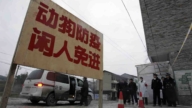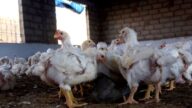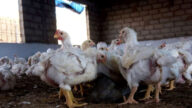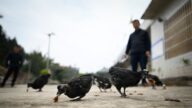【新唐人2013年04月11日訊】H7N9禽流感疫情出現後,隨著死亡病例的不斷增加,民眾迫切希望了解疫情的全部真相。但至今疫情的發源因素、以及中國到底有多少患者,官方至今沒有對外公布。然而,民眾在微博上發表疫情信息,卻被當局以「散佈謠言」的罪名處罰。
連日來,如何預防和控制H7N9禽流感疫情,成為中國網友關注和討論的焦點。很多網友把知道的信息及時的發佈到網路上,結果被當局以「涉嫌編造、故意傳播虛假恐怖信息」罪名,給予了刑事拘留和行政處罰。
大陸媒體報導說,4月8號、9號,貴陽警方將發佈「貴陽發現H7N9病毒」信息的三人抓獲,並對三人處以5天到10天的行政拘留。
而在此之前,西安市一男子南某,在微博發佈禽流感相關信息,被西安市公安局長安分局予以刑事拘留;另外,浙江慈溪的柳某等三人,同樣被慈溪警方以散佈「H7N9疫情謠言」為由,進行拘留5天。還有江蘇和福建的網友也遭到處罰。
最早的H7N9禽流感死亡病例是從上海傳出,但官方遲報20多天。3月,網上微博盛傳「浙江杭州出現不明原因疾病傳播」,當時,杭州當局很快指稱微博的內容為謠言,並且拘留了發微博的網友張某。事隔不久,杭州確診兩人感染H7N9禽流感。
當局對H7N9禽流感疫情擴散的態度,以及對網友的這種處罰,引起中國民眾的強烈不滿。
浙江人士余先生:「它以這個名義,它任何事情都可以給戴個帽子。如果連這種評論都是散佈謠言的話,那不是說人家說話的自由都沒有了。」
北京律師江天勇表示,網友發佈出來的信息對大家有警示作用,當局把這種所謂「謠言散播者」抓起來,完全是一種打擊言論自由的行為。
北京律師江天勇:「如果說一個人說這樣的信息,說是謠言就要被抓起來,那官方得有多少人被抓?央視、人民日報、新華網公布了多少虛假信息,這種以國家的傳播力,動用行政資源、動用國家財力去散佈的謠言豈不危害更大?可是我們沒有見到去把這個官方的謠言的散播者或者機構進行處罰。」
上海名為「厄運天使」的網友,7號深夜在微博上說:「大家注意了!瑞金醫院發生重大誤診!」導致他的姑父禽流感引發重症肺炎死亡。他說,他的姑父4月3 號因發燒到瑞金醫院就診,確診為肺炎。開了三天肺炎的頭孢(抗菌藥),結果7號晚間8點去世!去世前,醫院拍胸片確診為重症肺炎。但醫院聲稱未確診為H7N9禽流感感染者。
這篇微博隨後遭到刪除。之後,上海官方公布瑞金醫院確診H7N9禽流感死亡病例一例,正是這名網友的姑父。
上海市民郭先生:「它們就是甚麼事情都不敢講真相。隱瞞的目地就是所謂維護表面的繁榮安定、太平,太平盛世。其實老百姓心中都充滿怨氣,就是打壓這些所謂網友,有些網友並不是無事生非,有些事情就是通過他們才能得到真相,但是我們政府不管,就說是造謠,拘留,老百姓很無奈的。」
目前,已經確定上海、浙江、江蘇、安徽、貴州、湖南、湖北等地出現H7N9禽流感死亡和疑似病例。隨著H7N9禽流感個案持續增加,香港首次公布9宗疑似個案,雖然通過快速測試,確定不是H7N9感染個案,但多位香港立法會議員質疑:大陸向香港通報疫情的機制不可靠,可能會造成港人錯判形勢,重演03年薩斯疫情爆發時的嚴重失誤。
美國疫苗專家林曉旭也對《新唐人》表示,大眾應該做好疫情已經擴散或將要擴散的準備。
採訪編輯/唐睿 後製/黎安安
Chinese Netizens Detained for Reporting H7N9
As H7N9 bird flu causes increasing deaths in Mainland
China, people are eager to learn the truth about the epidemic.
Chinese authorities, however, have not announced the cause
of the epidemic or the total number of infected cases.
When some Chinese netizens released information about
the epidemic on weibo, they are punished for “spreading rumors."
Over past days, netizens all over China have been concerned
about the prevention and control of H7N9 avian flu.
Some netizens published timely information
about the flu on the Internet.
As a result, they are arrested and punished by
Chinese authorities for “deliberately fabricating and spreading terrorist news.”
Mainland media reported that on April 8 and 9,
Guiyang police arrested three netizens who published
online news about “H7N9 in Guiyang."
They received 5-10 days administrative detention.
Prior to this, some Mr. Nan in Xi’an city was detained
by police for releasing avian flu information on weibo.
Mr. Liu and another two people in Cixi of Zhejiang
were detained by police for the same reason.
So were netizens in Jiangsu and Fujian.
The earliest death report of H7N9 avian flu came from
Shanghai, but the official report was delayed for over 20 days.
In March, news spread widely online that an “unidentified
disease spread in Hangzhou of Zhejiang.”
Hangzhou authorities soon alleged the weibo news
as rumor and detained the netizen Mr. Zhang.
Soon later, Hangzhou authorities confirmed
two deaths from H7N9.
Chinese authorities’s control of H7N9 and its attitude toward
Internet information about the flu triggered strong dissatisfaction.
Mr. Yu from Zhejiang Province: “They
[Chinese authorities] can label anything as rumor.
If releasing such information counts as spreading rumor,
are people still free to talk at all?"
Beijing lawyer Jiang Tianyong said Internet
information provides warnings to the public.
When Chinese authorities arrest those who release
such news, they are suppressing freedom of speech.
Jiang Tianyong: “If someone releasing such news should be
arrested, how many official media workers should be arrested?
How many false news have been published by CCTV,
People’s Daily, Xinhua News Agency, etc.?
Isn’t it more dangerous to spread rumor
through the national and official channels?
We have never seen the punishment of official
media workers who release and spread rumors."
April 7th late night, Shanghai netizen named
“Doomed Angel" said on weibo:
“Attention! Serious misdiagnosis in Ruijin Hospital
incurred my uncle’s death!"
He said his uncle visited Ruijin Hospital
on April 3rd for a fever.
The doctor diagnosed it to be pneumonia and
gave him antibacterial drugs for three days.
His uncle died at 8 p.m. on April 7th.
X-ray examination before his death shows him
to have died of severe pneumonia.
The hospital denied that he died from H7N9.
This weibo post was subsequently deleted.
Soon after, Shanghai authorities announced
a H7N9 death in Ruijin Hospital.
The victim proved to be the netizen’s uncle.
Shanghai Residents Mr. Guo: “They [Chinese authorities]
are always afraid to tell the truth.
They conceal the truth so as to maintain
so-called prosperity and stability.
In fact, the people are full of grievances.
They know only to suppress those netizens.
The netizens are not making things up.
Instead, they are often the sources of truth.
But our government simply label their information
as rumors and detain them.
Chinese people really feel helpless."
Currently, H7N9 has caused deaths and suspected
infections in Shanghai, Zhejiang, Jiangsu, Anhui, Guizhou, Hunan, Hubei, etc.
As the number of H7N9 cases continue to rise,
Hong Kong announced nine suspected cases, all to be denied after quick tests.
Members of Hong Kong Legislative Council questioned
the authenticity of H7N9 reports from Mainland China.
They are afraid that such false information might
lead HK people to misjudge the situation and repeat the disaster of 2003 SARS.
U.S. vaccine expert Lin Xiaoxu told NTD that the public
should prepare for immanent dissemination of the epidemic.



























